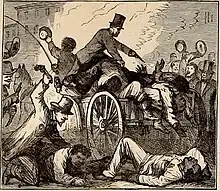
Thomas Nast illustration of the New Orleans massacre of 1866
The Freedmen massacres were a series of attacks on African-Americans which occurred in the states of the former Confederacy during Reconstruction, in the aftermath of the American Civil War. Many of these incidents were the result of a struggle over political power, especially after the voting rights of freedmen were protected through the Fifteenth Amendment to the United States Constitution.[1] Robert Smalls estimated that overall 53,000 African-American were killed in post-war racial terrorism, an estimate increasingly considered plausible by historians.[2]
With reference to emancipation, we are at the beginning of the war.
— David L. Swain, former governor of North Carolina, 1865. as quoted in Eric Foner's Reconstruction: America's Unfinished Revolution
| Incident | Year | Month | State | County or parish | Notes |
|---|---|---|---|---|---|
| Memphis massacre | 1866 | 05 | Tennessee | Shelby | |
| New Orleans massacre | 1866 | 07 | Louisiana | Orleans | |
| Camilla massacre | 1868 | 09 | Georgia | Mitchell | |
| Opelousas massacre | 1868 | 09 | Louisiana | Opelousas | |
| 1868 St. Bernard Parish Massacre | 1868 | 10 | Louisiana | St. Bernard | |
| Millican massacre | 1868 | 07 | Texas | Brazos | [3] |
| Jackson County War | 1869 | n/a | Florida | Jackson | Ongoing for almost two years |
| Eutaw massacre | 1870 | Alabama | |||
| Meridian race riot of 1871 | 1871 | 03 | Mississippi | Lauderdale | |
| Colfax massacre | 1873 | 04 | Louisiana | Grant | |
| Election Massacre of 1874 | 1874 | 11 | Alabama | Barbour | |
| Coushatta massacre | 1874 | 08 | Louisiana | Red River | |
| Vicksburg massacre | 1874 | 12 | Mississippi | Warren | Ongoing for almost one month[4][5] |
| Battle of Liberty Place | 1874 | 09 | Louisiana | New Orleans | |
| Clinton Riot | 1875 | 09 | Mississippi | Hinds | |
| Hamburg massacre | 1876 | 07 | South Carolina | Aiken | |
| Ellenton riot | 1876 | 09 | South Carolina | Aiken |
North Carolina
- "Four murders, 30 whippings, and 16 other horrible outrages" (1871, Alamance County)[6]
See also
- Pulaski riot
- Kirk–Holden war
- Black suffrage in the United States
- Enforcement Acts
- Freedmen's Bureau
- Ku Klux Klan § First Klan: 1865–1871
- Red Shirts (United States)
- Lynching in the United States
- Reconstruction Amendments
- Nadir of American race relations
- Murders of Chaney, Goodman, and Schwerner (1964)
- Orangeburg massacre (1968)
- List of massacres in the United States
- Mass racial violence in the United States
- List of disasters in the United States by death toll
References
- ↑ "Southern Violence During Reconstruction". American Experience (PBS). Retrieved November 29, 2020.
- ↑ Magazine, Smithsonian; Egerton, Lisa Elmaleh,Douglas. "Terrorized African-Americans Found Their Champion in Civil War Hero Robert Smalls". Smithsonian Magazine. Retrieved 2023-12-04.
{{cite web}}: CS1 maint: multiple names: authors list (link) - ↑ Jones, Halle (2022-02-02). "1868 Millican Massacre: The secret left out of Brazos Valley History". 25 News KXXV and KRHD. Retrieved 2023-08-08.
- ↑ Fedell, Vera Ann (2022-12-16). "VICKSBURG FACTS: The bloody steps to the Vicksburg Massacre". The Vicksburg Post. Retrieved 2023-08-08.
- ↑ Edwards, Josh (2015-05-21). "Portrait of first black sheriff on display". The Vicksburg Post. Retrieved 2023-12-12.
- ↑ "Ku Klux Klan: Appalling Record of Murder and Crime". New York Daily Herald. 1871-03-16. p. 5. Retrieved 2023-12-12.
This article is issued from Wikipedia. The text is licensed under Creative Commons - Attribution - Sharealike. Additional terms may apply for the media files.